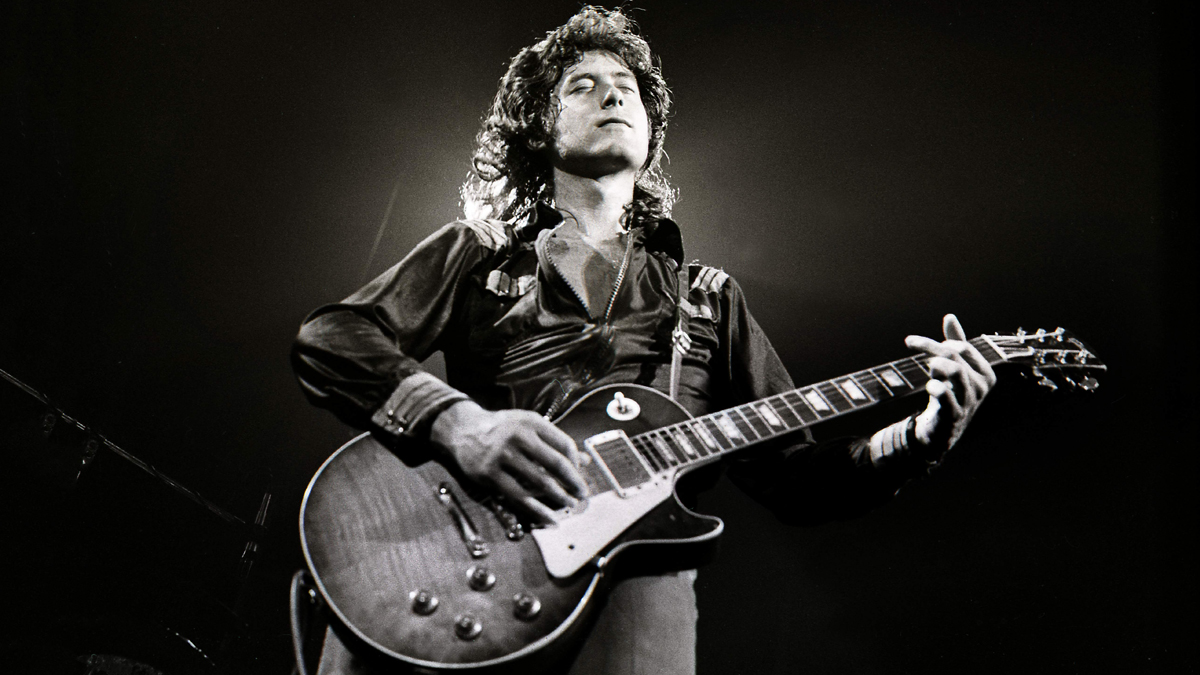Jimmy Page reveals why he switched to Gibson Les Pauls – and how Joe Walsh helped shape the sound of Led Zeppelin II

Few guitar/player partnerships are as iconic as Jimmy Page and the Gibson Les Paul. Indeed, the Led Zeppelin legend is synonymous with the single-cut, having switched to the ranks of Gibson after almost exclusively using a Fender Telecaster for the band’s debut album.
Though somewhat similar in ergonomic design – both have single-cut bodies, after all – the differences between the Telecaster and Les Paul are night and day, with distinctions in almost every department, from body and neck material to electronics and hardware.
Writing on social media, Page recently took a deep dive into these tonal and functional differences, and revealed why such contrasting specs ultimately convinced him to permanently switch to the Les Paul.
And, while doing so, he revealed how Joe Walsh helped him along the way, with the James Gang icon once selling him the Les Paul Standard that went on to construct the “sonic texture” of Led Zeppelin II.
In a lengthy statement posted to Instagram, Page reflected on his friendship with Walsh, saying the pair’s close connection can be traced back to his Yardbird days in the mid ‘60s, when Walsh – then part of James Gang – would come to watch the band when he was in town.
A post shared by Jimmy Page (@jimmypage)
A photo posted by on
It was during this era that Walsh introduced Page to a particular Les Paul Standard, which soon usurped the Fender Telecaster as the young Led Zep maestro’s go-to guitar.
“Back then, Joe brought a Les Paul Standard along to a Fillmore East gig on the first leg of the American tour and said, ‘You’ve got to have this guitar,’” Page explained. “I said, ‘Well, I don’t need it, Joe, I’ve got a Les Paul Custom.’”
Get The Pick Newsletter
All the latest guitar news, interviews, lessons, reviews, deals and more, direct to your inbox!
Page was already familiar with the Les Paul’s potential, as he reveals: “I knew that Les Paul guitars were very user-friendly, insomuch as they put out a lot of level when you plugged them into the amplifier because they had a double-coil pickup, whereas the Telecaster had a single-coil pickup.
“With the sort of volume that I now needed to put out in live situations, although I was using controlled feedback, I found that the Telecaster was starting to squeal a bit.”
Indeed, this erratic nature of the Tele at high volumes – as well as its inability to fully tame feedback – was what initially put Page on to the Les Paul.
He continued, “I had to be very careful about where I was standing because of the unsympathetic feedback. With the Les Paul you’d get feedback through the amp and speakers, but you could control it more easily and work with it. You could actually change the literal note and frequency that was coming back on the feedback.
“I just really enjoyed playing Joe’s guitar, and so I agreed with him that maybe I should buy his Les Paul Standard after all.”
Page enjoyed it so much, in fact, that he went on to use Walsh’s Les Paul on some of Led Zeppelin’s biggest hits, from Whole Lotta Love to What Is and What Should Never Be. Not only that, the Les Paul helped shape the entire sound of Led Zep’s second album, just as the Fender Telecaster had influenced their debut record a few months before.
“I played the Les Paul on Whole Lotta Love and What Is and What Should Never Be and that decided it for me: it was definitely going to be the Les Paul from then on,” Page concluded. “I always wanted to make a change for each album sonically and that was my first decision for Led Zeppelin II.
“Like I had built Led Zeppelin around the Fender Telecaster, I built the second album around the sonic texture of the Les Paul Standard. Neither Joe Walsh nor I realized at the time just what an important thing he had done by coming along with that Les Paul.”
Walsh himself has spoken about the Les Paul that ended up in Page’s hands on previous occasions. Speaking to Cory Wong’s Wong Notes podcast, Walsh recalled how the Led Zeppelin legend once told him back in the ’60s the “Telecaster ain’t cutting it for” him anymore.
“Jimmy and I became friends,” Walsh said. “Jimmy said to me, ‘Look, The Yardbirds is great, and I played on so many records…’ He played on so many sessions. If you look up what he played on, you’ll be amazed.
“But he said, ‘This Telecaster ain’t cutting it for Led Zeppelin. And I don’t know what to do.' Now, Les Pauls virtually didn’t exist in England at the time,” Walsh added. “They didn’t hit popularity yet, and they were pretty easy to find because they hadn’t been discovered – and they didn’t cost very much.
“After the fact, when that became the guitar for rock ‘n’ roll, the rest is history. But he said, ‘I got to get a double-coil situation and I’ve looked for Les Paul, there aren’t any in England. Do you know any way you could help me get one? Because Led Zeppelin ain’t making it with a Telecaster.’”
That guitar, according to Walsh, is Page’s “Number One”: “The body of Led Zeppelin music is that Les Paul that I gave him.”
Though there are some discrepancies between the two recollections – each guitarist insists the other approached them about the Les Paul, and Walsh fails to mention Page’s original Les Paul Custom – the outcome of how Page defected to the ranks of Les Pauls remains ultimately unchanged.
Though it's often thought that Page played a Fender Telecaster for the entirety of Led Zeppelin, there was one other guitar he used: a Gibson Flying V, which featured on the band's cover of You Shook Me.

Matt is the GuitarWorld.com News Editor. He has a Masters in the guitar, a degree in history, and has spent the last 16 years playing everything from blues and jazz to indie and pop. When he’s not combining his passion for writing and music during his day job, Matt records for a number of UK-based bands and songwriters as a session musician.
“His songs are timeless, you can’t tell if they were written in the 1400s or now”: Michael Hurley, guitarist and singer/songwriter known as the ‘Godfather of freak folk,’ dies at 83
“The future is pretty bright”: Norman's Rare Guitars has unearthed another future blues great – and the 15-year-old guitar star has already jammed with Michael Lemmo











